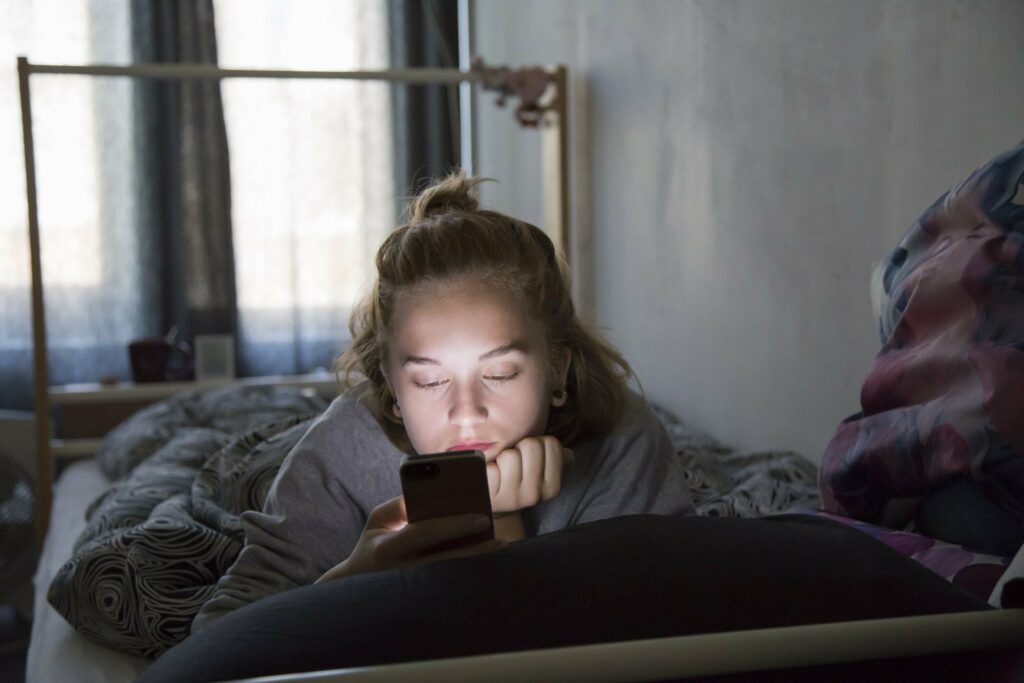By Familyguide Contributor
A recent study suggests that not all pre-bedtime screen use negatively affects sleep, though parents should remain vigilant about their children's device usage before bed.
The Journal of the American Medical Association Pediatrics published research concluding that "objectively measured screen time in the 2 hours before bed had no association with most measures of sleep health."
While the researchers noted that "particularly interactive screen activities, such as gaming and multitasking, was associated with less sleep," overall, they suggested that "presleep recommendations require modification" based on their findings.
WLFI News 18 reported on the study, explaining that "there was no interference with sleep in kids using devices in the two hours before bed, but letting them stay on the phone under the covers did have a negative effect."
"Once kids are in bed, screens and sleep start competing for the same time slot, and that's where a negative impact on their sleep begins to emerge," the outlet added.
Despite JAMA Pediatrics' study suggesting minimal negative effects from pre-bed screen time, many experts still advise caution. The American Academy of Child & Adolescent Psychiatry recommends "turning off screens and removing them from bedrooms 30-60 minutes before bedtime."
Dr. Joanna Cooper, a neurologist and sleep medicine specialist with the Sutter East Bay Medical Foundation, explained, "The light from our screens can delay our transition to sleep, even if we are engaged in some soothing activity online. It's more likely that our evening texting, television shows or video games are stimulating in themselves, keeping the brain busy and wound up, and even causing adrenaline rushes instead of calm."
Familyguide previously reported on the negative effects of screen time before bed:
A recent study has revealed the true impact of social media scrolling before bed on Americans' sleep quality.
"If you're guilty of using your phone right before bed, you could be tricking your brain into thinking it's still daytime, thanks to the blue light your phone emits," Mattress Next Day reported.
The Sleep Foundation explained that the blue light emitted by phones and laptop screens can "reduce or delay the natural production of melatonin in the evening and decrease feelings of sleepiness. Blue light can also reduce the amount of time you spend in slow-wave and rapid-eye movement (REM) sleep, two stages of the sleep cycle that are vital for cognitive functioning."
The Mattress Next Day study found that most Americans spend time on messaging apps like WhatsApp and social media platforms like X, TikTok and Instagram before bed.
"Despite extensive research showing that blue light can affect sleep, more than two-thirds of Americans admit to using phones, iPads and other electronic devices before bed," the study continued.
In another study published by the National Library of Medicine, researchers found that "using mobile phones during bedtime affected sleep," and that reducing the use of phones before bedtime "increased sleep duration, positive affect, and working memory."
You may also like
-
Actress’ Baby Only Wanted THIS?! God SHOCKED Her With The Truth!
-
Discord: Is Your Child's Soul at RISK? (The TRUTH Parents MUST Know!)
-
Candace Cameron Bure's Kids Asked Her *This* Question About Faith?!
-
Hollywood Star's Secret Weapon for Sharing Faith Fearlessly!
-
PBS Kids Just Did WHAT?! The Future of Family Gaming is Here!

